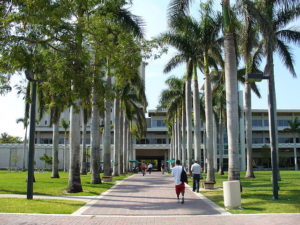Humanism Goes Higher: AHA Awards University of Miami for Philosophical Diversity
 The Otto G. Richter Library on the University of Miami campus.
The Otto G. Richter Library on the University of Miami campus. Universities exist as centers of learning and progress; they cultivate intellectual curiosity and discovery while holding firm to an academic rigor that puts truth above all else. Ideally, universities are places where all ideas can be explored and examined on their own merits, where free and fair inquiry is protected from the influence of dominant public opinion. Sadly, the study of humanism, atheism, and secular ethics has long been absent from academic discourse.
In an effort to close this gap, the American Humanist Association (AHA) offers its annual University Award for Philosophical Diversity to post-secondary learning institutions that foster a culture of intellectual openness that allows humanism and a diverse array of other philosophical perspectives to flourish.
American Humanist Association President Sunil Panikkath presented the AHA’s 2019 University Award to the University of Miami in a public ceremony on February 6. The ceremony also commemorated the establishment of the University of Miami’s Endowed Chair for the Study of Atheism, Humanism, and Secular Ethics. The new chair position—made possible by a $2.2 million endowment from the Louis J. Appignani Foundation—is the first of its kind in the United States, and was the predominant factor in AHA’s decision to grant the award to the University of Miami.
Louis Appignani sees the chair as an academic milestone. “This chair establishes a precedent that puts atheism on equal footing with religion and gives academic credibility to atheism as a method of developing ethics,” said Appignani. “I expect the new chair to have very positive ramifications for secularism.”
Anjan Chakravartty, a professor of philosophy at the University of Miami, was appointed to the chair position on July 1, 2018. Chakravartty is primarily a philosopher of science, but he takes a multidisciplinary approach to the chair’s focus of study. “The beauty of the chair is that there are so many ways to approach the issues it addresses—history, philosophy, psychology, sociology, anthropology, the law, and beyond,” Chakravartty says. “Unlike a traditional academic chair, its focus is a constellation of issues, not a disciplinary field. My hope is that over the generations this chair will engage with a wide range of the many aspects of its subject matter.”
Just as the approach to studying humanism, atheism, and secularism is multi-faceted, the benefits of study are pluralistic in nature and have major implications on other academic fields, especially the sciences. “We still have a lot of work to do in figuring out how best to bring humanistic values to bear in doing science for the common good, and the good of the planet,” notes Chakravartty. “The production of scientific knowledge, and knowledge generally, is more infused with values than many appreciate, and humanistic traditions have interesting and important things to say about what those values should be.”
Historically, humans have looked to various religious faiths to ground their values, but the fastest growing religious identification in the United States, according to Pew Research, is “none,” or religiously unaffiliated. The trend is even more pronounced among younger demographics; one in three Americans under the age of thirty-five lack a distinct religious affiliation. Considering that this age group makes up the majority of university populations, it’s likely we’ll see increased attention to humanist and secular ethics as higher education responds to piqued interest in non-religion.
“Universities should provide sustained and serious opportunities for students to learn about humanist thought alongside other philosophies whether they are religious or nonreligious,” says AHA President Panikkath. “With the installation of Professor Chakravartty in the Appignani Chair, the University of Miami is sending a strong signal that the study of humanism is an important component of academia in the twenty-first century, where more than twenty percent of Americans identify as religiously unaffiliated.”
Professor Chakravartty shares Panikkath’s assessment:
The country and world in which we live are increasingly non-religious. Understanding not just why these trends are occurring but what it means for how people see themselves and their relationships to each other and the planet is not merely an intellectual pastime. We can hardly hope to make the world a better place unless we understand what we take ourselves to know, what makes us tick, what motivates us, and what aspirations we have for ourselves and the future.
Colleges and universities serve a unique role in the pursuit of answers to these profound questions. “Universities are the central arenas where ideas are reflected on, debated, and refined,” Panikkath concludes. “With wider opportunities for such reflection, debate, and refinement, humanism can only become strengthened as a practical philosophy that helps people lead ethical lives.”
